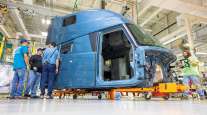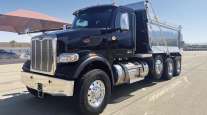VW Completes Acquisition of Rival MAN; Seeks to Be Key Player in Global Market
This story appears in the Nov. 14 print edition of Transport Topics.
Vehicle manufacturer Volkswagen AG said last week that it completed the purchase of a majority stake of fellow German truck producer MAN SE, opening the way to becoming “a new top player on the global truck market.”
VW has been trying for years to merge its commercial vehicle operations with MAN and with truck manufacturer Scania AB of Sweden, which it has controlled for five years.
“The Volkswagen Group has moved a key step closer towards realizing its goal of an integrated commercial vehicles group” by combining the three operations, VW said in a statement Nov. 9.
Following the latest transaction, “Europe’s largest automaker now holds 55.9% of the voting rights and 53.71% of the share capital of MAN SE,” VW said. The company is also a major worldwide auto producer.
“This marks the birth of a new top player on the global truck market,” Martin Winterkorn, CEO of Volkswagen AG, said in a statement at VW’s headquarters in Wolfsburg, Germany.
The combined companies sell more trucks in Europe than do either Sweden-based Volvo AB or Germany’s Daimler AG.
“MAN and Scania together had 30% of the European heavy-truck market last year . . . [while] Volvo and Stuttgart-based Daimler each had 21%,” Bloomberg News reported earlier this month.
VW said the combined operations are “expected to generate annual synergies of at least EUR 200 million [$272.7 million]” for the company.
VW said the savings would come initially from procurement activities, followed by closer cooperation in research and development, as well as in production.
CEO Winterkorn “stressed” that the brand-specific characteristics and business areas of MAN will “remain unaffected.”
However, “Volkswagen is keeping all options open to further shape an integrated commercial vehicles group going forward,” the company added.
The move to take a majority stake in MAN came after the Chinese government approved the move Nov. 3.
“Volkswagen, MAN and Scania are with joint-ventures and major shareholdings in China [that are] active,” Volkswagen spokesman Marco Dalan told Transport Topics Nov. 9, in explaining why Chinese approval was necessary.
“VW has been trying to consolidate these companies for many years to make them more efficient in Europe,” Chris Brady, president of Commercial Motor Vehicle Consulting, Manhasset, N.Y, told TT.
“MAN acquired 25% of Sinotruk back in 2009, and the two companies launched the Sitrak brand in August of this year,” Oliver Dixon, a commercial vehicle consultant in England, told TT, explaining the Chinese connection. “VW has a very considerable car business there [in China] too.”
Both Brady and Dixon said VW would probably initially concentrate on Europe, but could eventually seek to expand in China, South America and perhaps North America.
“When people talk about consolidation, they think it reduces competition, but they’re wrong,” Brady said. “They should compare the U.S. car market today to 30 years ago. Even though we’ve had major consolidations, we have more players than ever, because as consolidations expand, they go outside their own markets.”
“I do think in the future, not near term, we’ll have more truck brands in the North American market, either through purchase of a company, or developing their own products,” Brady explained. “It’s too big of a market for a global expansion not to enter.”
Dixon agreed.
“As for U.S. market entry, there’s every reason to assume that . . . will happen [though the] Class 8 [market] probably is over-populated at present,” Dixon said.
“But one of the bases of the argument, acquisition of a U.S. company, seems probable. Which one remains to be seen,” Dixon added.




